Women footballers:Born with talent, held back by prejudice
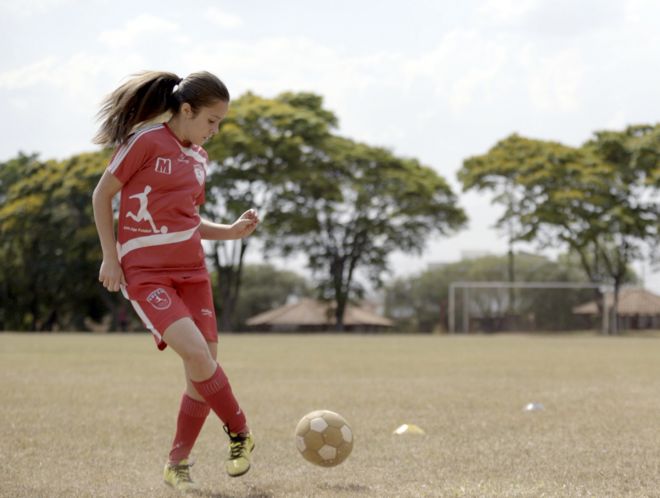 Laura Pigatin is one of the many girls dreaming of becoming a professional footballer
Laura Pigatin is one of the many girls dreaming of becoming a professional footballer
Football is one of the most popular female sports, with about 30 million girls and women playing it worldwide. But in several countries, girls are not allowed to play. In others, they are discriminated against. Even in football-crazy Brazil, women come up against a lot of challenges as Irene Caselli, Claudia Jardim and Mariangela Maturi found when they spoke to well-established and aspiring female footballers in Africa, Europe and Latin America.
"It was just me, a girl in the middle of a lot of boys," says Marta Vieira da Silva, the Brazilian football legend who is better known just as Marta.
Not only does she hold the record for the most goals scored at the Women's World Cup, she is also the only woman to have been named the world's best female footballer five times.
Nevertheless, Marta says she did not have an easy time of it starting out in football.
"My family didn't approve. They didn't accept it because people still thought that girls weren't allowed to play football," she recalls.
'Incompatible with women's nature'
Marta was born in 1986, seven years after a government-imposed ban on women practising sports "incompatible with their nature" was lifted.
The ban had been in place from 1941 until 1979 and clearly influenced the way even players regarded women.
In the year that the ban was lifted, Pelé told a local paper that football "can be a hobby, but not a real sport for women".
It comes as little surprise that prejudice and stereotypes remained even after the ban was lifted.
Born in Dois Riachos, a small town in the poor state of Alagoas in north-eastern Brazil, Marta had to struggle to be recognised.
Brought up by her mother after her parents separated when she was only one, she learned to play football with the boys in the streets of her hometown.
If her older brother approached, she would hide, afraid he might punish her for playing a "men's game".
 Marta says playing football makes her happy
Marta says playing football makes her happy
She eventually joined a club but says that as late as 1999 she was banned from playing in a tournament because she was a girl.
"I was very frustrated at that moment. I looked around, I stopped to think, and I just couldn't understand it," she recalls.
"Why is it so hard to accept that a human being was born with a talent, knows how to play, wants to do it and that is what makes her happy?"
Cultural stereotypes are not limited to Brazil either.
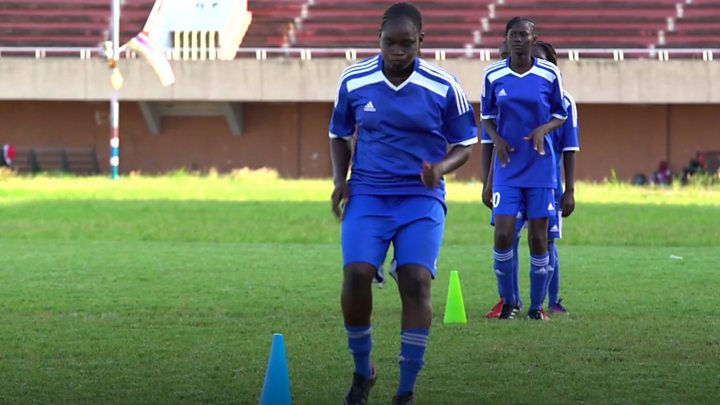
And despite women like Marta making it big, young female players in Brazil still struggle.
'Absurd rules'
Laura Pigatin, 14, is serious and disciplined and fully dedicated to achieving her dream of becoming a professional footballer.
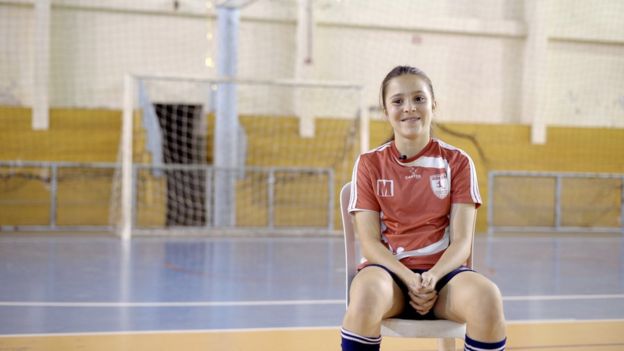 Laura Pigatin was banned from playing with her team because she is a girl
Laura Pigatin was banned from playing with her team because she is a girl
She trains several times a week, both in futsal and football. Since there are no female teams of her age group in her hometown of São Carlos, she plays in the all-boys team.
Two years ago her team qualified for the championship in São Paulo state but state officials banned Laura from playing because they said that the tournament was only for boys.
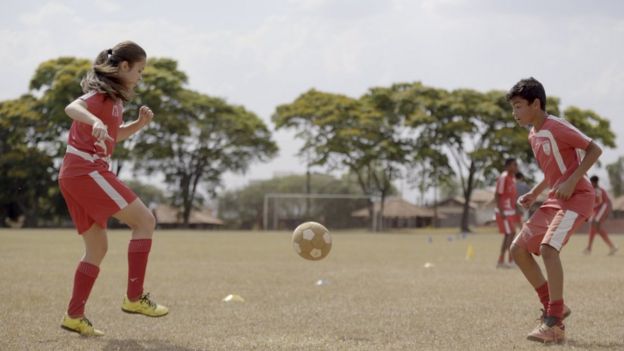 The team Laura plays for is made up of boys...and her
The team Laura plays for is made up of boys...and her
Eventually the authorities caved in and Laura was allowed to play after a campaign led by her parents gathered momentum.
But it proved to be a fleeting victory as Laura was again banned from playing in the second phase of the tournament in 2017.
"I was very sad because I helped the team to be champion in the first phase and I was not going to be able to play the second phase, which was more important," Laura says.
"Marta's story is more or less similar to mine. Since then, things should have changed, and it should be allowed for girls to be able to play. It's absurd."
Making do
But change has been slow. Since the 1980s, few resources have been dedicated to women's football in Brazil.
Several national tournaments were discontinued, and female players earn so little they often have to work another job.
Brazil's national women's football league was launched as recently as 2013 and even top teams are severely underfunded.
Rio Preto Esporte Club won the national women's league in 2015 and the São Paulo championship in 2016 and 2017.
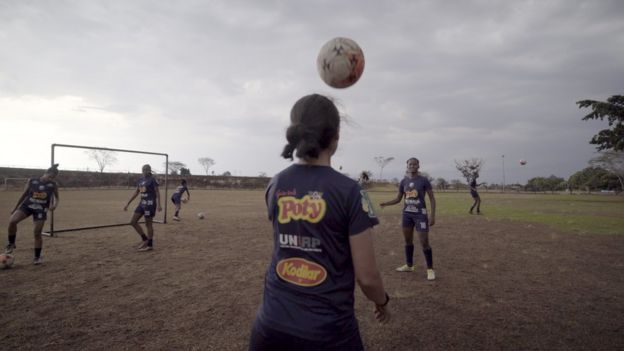
The ground they train on is full of holes where ants have built their nests.
They have no dedicated coach with a senior player taking on coaching duties instead.
The players all live in a house provided by the club's owners with five of them to a room as their 1,500-reais monthly scholarships (£330, US$460) do not stretch to more.
Going abroad to make it
Despite Brazilians' love of football, the best female players move abroad to make their career at foreign clubs.
Marta, for example, moved to Sweden at age 18 and now holds dual nationality. Despite her many achievements, in Brazil she is often referred to as "Pelé in a skirt".
 Marta plays for Orlando Pride and Brazil's national women's team
Marta plays for Orlando Pride and Brazil's national women's team
"There is always a comparison between her and Pelé, even though Marta scored more goals for the national team," says Angelica Souza of Dibradoras, a Brazilian website dedicated to women's sport.
"She's a woman so she'll always be compared to a man, she'll always be 'Pelé in a skirt', rather than Pelé being known as 'Marta in trousers'."
Fifa's chief women's football officer Sarai Bareman says what is needed are more role models.
"In South America, there is a negative perception for young girls trying to get into the game," she says.
Role models have worked in some countries, such as Denmark where Nadia Nadim is inspiring girls from different ethnic backgrounds to play football.
Marta says there is no magic wand to bring about change.
"We have to do it by fighting, doing our job in the best possible way by showing people that women's football is possible," she says.
"Women's and men's football are the same thing: the field is the same, the ball is the same, there is the same desire to do your best, setting an example to continue inspiring the children, so that the new generations can accept it in a natural way."
Source:http://www.bbc.com/news/world-latin-america-43198651


No comments:
Post a Comment